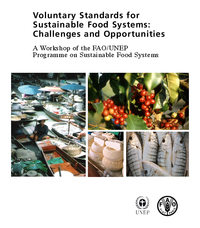Food System Sustainability Standards: Room for Everyone?
DOI:
https://doi.org/10.5304/jafscd.2016.063.004
Keywords:
Sustainability, Voluntary, StandardsAbstract
First paragraphs:
Fair-trade coffee is a familiar item in most Canadian cities and towns, and most grocery stores now stock organic produce. These products are examples of voluntary sustainability standards (VSS) and were introduced into the Western marketplace in the 1980s. VSS "are voluntary schemes conveying information of relevance to sustainability about the process of production of specific products according to a reference standard or measurement" (Maybeck & Gitz, 2014, p. 173, in Maybeck & Redfern, 2014) and are typically implemented by businesses, assessed by third parties, and driven by consumer demand (Maybeck & Redfern, 2014).
The past decade has witnessed a proliferation of VSS, driven by consumer demand for safe, high quality, and ethically and sustainably produced goods (Blackmore & Keeley, 2012). VSS are a promising mechanism by which we might increase worker rights, enhance ecosystem services, and im¬prove the quality of various goods. Even so, VSS schemes have come under criticism on a number of counts, such as excluding smallholder farmers and all farmers in low-income countries due to high certification and compliance costs. VSS (such as fair-trade) provide no provisions for greater benefits to farm employees above the accepted industry standards. Finally, the premiums charged for VSS products are consumed in support of the cooperatives and other associations necessary to manage the VSS designation (Henderson, 2008) rather than yielding higher returns to the small-holders producing goods for the fair-trade market....
See the press release for this article.
Metrics

Downloads
Published
How to Cite
License
Copyright (c) 2016 Keith Williams

This work is licensed under a Creative Commons Attribution 4.0 International License.
The copyright to all content published in JAFSCD belongs to the author(s). It is licensed as CC BY 4.0. This license determines how you may reprint, copy, distribute, or otherwise share JAFSCD content.











